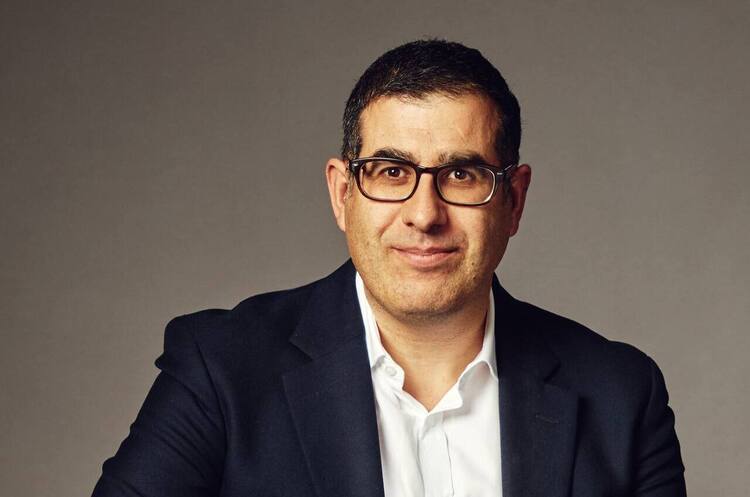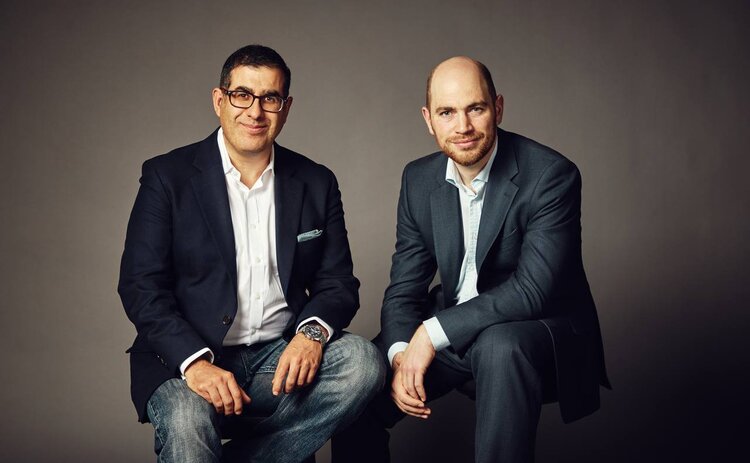Bloomberg journalist Javier Blas: "russia’s invasion of Ukraine made commodity trading very profitable"
The bestselling co-author of a book on global trading shares his vision of the new sectoral rules of the game in an interview with Mind

“We'd rather you didn't write that,” was the reaction of Ian Taylor, the former head of Vitol (and business partner of Victor Pinchuk, owner of the Ukrainian Interpipe Group), when he learned that Bloomberg journalists Javier Blas and Jack Farchi had been working on a book about the rather closed male-dominated world of global commodity business, which rests on huge amounts of money, political intrigue and backroom deals.
However, their book “The World for Sale. Money, Power and the Traders who Barter the Earth's Resources” was published by Penguin in 2021 and immediately became seminal in the business community. This year, in June, Nash Format publisher is releasing its Ukrainian translation.
Ahead of this, Mind talked to Javier Blas about how russia's invasion of Ukraine is affecting commodity traders' business and their “art of the deal” with traditions dating back to post- World War II. At that time, this industry gained unprecedented scale. The upheavals in the oil-rich Middle East, the fall of the Berlin Wall, the collapse of the Soviet Union, and China's rapid economic development all these were events that allowed unknown but extremely resourceful people, mostly with offices in the Swiss canton of Zug or on the shores of Lake Geneva, to become extremely wealthy and gain powerful geopolitical influence.
They have created a profession where success depends on personal contacts for exclusive access to natural resources, a penchant for taking big risks and excitement. This is a business where, for years, everything was allowed, everything was justified, and all means were good for success. So what is happening in commodity trading these days, when russia has unleashed an armed conflict in Ukraine – the largest in Europe in the last half century? How have the unprecedented anti-russian sanctions affected the financial flows that support the Kremlin’s ability to continue the war? Do the restrictions in the Black Sea create grounds for corrupt ties between traders and Ukrainian officials? Javier Blas discussed this and much more in an exclusive interview with Mind.

Õàâ’ºð Áëàñ ³ Äæåê Ôàð÷³
– In the book, you talk about the behind-the-scenes world of global commodity traders who have strong financial power, are able to make fateful deals of geopolitical significance and even ignite military conflicts for their own benefit. Their power can be higher than that of political leaders in some countries. Players like Trafigura or Vitol, in particular, rescued the USSR and russia in difficult times and entered into corrupt ties with their authorities. How has russia's full-scale invasion of Ukraine affected the established traditions of this opaque and obscure business?
– The invasion of Ukraine has triggered Western sanctions to russia, which has forced some traders to stop buying and selling russian commodities. But their space has been occupied by new traders, operating mostly from Dubai and Hong Kong, which are helping Moscow to bypass the sanctions.
Generally, the consequences of the invasion of Ukraine has been very profitable for the commodity trading industry, as it triggered market conditions that allowed the companies to make record profits in 2022. The higher-than-normal profits continued in 2023 and appears to do so in 2024 too.
– Where were commodity traders able to retain their geopolitical role and influence today?
The commodity traders remain big financiers in Africa and Latin America, providing credit to countries, and so their influence remains high. Glencore, for example, remains a top creditor of African nation Chad. Chinese commodity traders just provided an economic lifeline to the junta of Niger, only months after the junta toppled the democratic government of the nation in a coup d’Etat.
– Is there any reason to say that Switzerland has lost its leadership in the commodities trading recent years transferring it to Dubai, which now became the main hub for russian oil trade?
– The russian oil trade has moved away from Switzerland in Dubai and Hong Kong. But Switzerland remains one of the world’s most important commodity hubs, still dominating flows in other natural resources.
The reason some traders relocated away from Switzerland was the imposition of sanctions and signs that the Swiss government, contrary to tradition, was taking more seriously the enforcement of those sanctions. Swiss prosecutors have also opened criminal cases against some trading houses, prompting some executives to rethink their view about doing business there.
– How effective are anti-russian sanctions given that there are commodity traders on the market who are professionals in their field, prone to high risks and non-transparent personal contacts?
The impact of Western sanctions on russian commodities flow has been mixed, at best. Mostly, it has re-arranged the flows, rather than limit them. I believe that russia continues to make good money selling its commodities, and that Western officials are naïve if they truly believe that the commodity sanctions are having a real impact.
– Around 90% of settlements in commodity trading are made in US dollars. Does this mean that the US is able to control financial flows in this area and block individual transactions that come to the attention of US regulators?
The widespread use of the US dollar in commodity trading allows American regulators and prosecutors to flex the muscle in the industry. But it doesn’t mean they can block every individual trade. What’s true is that the US of the dollar – and therefore, of the American banking system – gives prosecutors jurisdiction in some transactions, allowing them to pursue wrongdoing. We have seen multiple cases of commodity trading houses admitting to bribery and other crimes in the US court, including three of the world’s most important traders: Vitol, Trafigura and Glencore.
– Could successful efforts by China, russia, the UAE or India limit the influence of the US dollar in commodity trade?
As the old Argentinian saying goes, it takes two to tango: a number of countries would clearly like to move away from the US dollar, but it requires that buyers and sellers agree.
The dollar has so many advantages – liquidity, convertibility – that most market participants still prefer it. Take russia: the country has tried to move away from the US dollar, but also has been reluctant to take payment in currencies such as the Indian rupee. Iran moved away of the dollar, but also is reluctant to take payment in Chinese yuan. For now, I think the efforts to move commodity trader significantly away from the US dollar would not work.
– Energy markets and the energy transition from fossil fuels to renewables are at the centre of the current global power shift. Does this mean that the geopolitical role of traders whose business is related to energy commodities and metals for green technologies has significantly increased?
– The world consumed last year record amounts of fossil fuels. Despite the inroads that renewable energy is making, the world still burns lots of oil, natural gas and coal, so the energy transition has yet to impact the business of the traditional commodity traders. But it’s clear that the industry is preparing for the transition. Some traders are doing more business in metals that will be important for the transition, such as copper, nickel and cobalt; others are investing in electricity trading. It’s also important to remember that some traders have already a leg on both sides. Take Glencore: it is the world’s largest coal trader and also the largest cobalt trader.
– The main commodities that Ukraine trades on foreign markets are grain, steel products and electricity. Did you come across any Ukrainian companies and businessmen in this area?
– We didn’t come across local traders, but clearly all the major agricultural international traders were very active in Ukraine. The country is a breadbasket and before the invasion most companies thought that it was a good business, hence why we saw many of them building infrastructure like silos and export terminals.
– In the book, you mention the story of ADM trader bribing the Ukrainian government officials to get a tax rebate (paid $22 mln via intermediaries between 2002 and 2008 to win a $100 mln). Are there prerequisites for increasing corruption risks in commodity trading because of war and trade restrictions in the Black Sea? Is that a common practice in the business of global traders in differrent contries?
The war increases the risk of corruption, in part because government officials and prosecutors are distracted, or they could turn a blind eye because the priority is to export grain, at whatever the cost.
– A few years ago, such traders as Vitol, Trafigura, and Axpo opened their offices in Kyiv. Today, the register of participants in the Ukrainian wholesale energy market also includes such powerful players as DXT Commodities, Gunvor, Nitor, In Commodities. What are the perspectives and consequences of their presence?
– The commodity market is evolving all the time, and we see new commodity traders arriving. In particular, one of the most recent trends is the growth of a new breed of companies focused on trading short-term electricity markets.
– Perhaps you are already collecting information for a new book about commodity trading? How interesting and significant is Ukraine in this politicised area now, in a time of geopolitical upheaval and redistribution of markets, especially energy and food?
– We don’t know yet what our next book would be about – but clearly, the invasion of Ukraine, alongside other events – like covid-19, the effective closure of the Suez Canal due to Yemeni attacks on shipping, the war Gaza, among others – is having a huge impact on commodity flows, creating winners and losers. Generally, the commodity traders thrive in volatile environments, and the current one is the most convulse politically and economically since the early 1970s. That’s why the profits of the industry are at a record high levels.
Gas United. Svitlana Dolinchuk's original Telegram channel:
- About the real gas business, based on common sense.
- How energy resources are traded in Ukraine and the world during the war.
- Facts, trends, comments.
If you have read this article to the end, we hope that means it was useful for you.
We work to ensure that our journalistic and analytical work is of high quality, and we strive to perform it as competently as possible. This also requires financial independence. Support us for only UAH 196 per month.
Become a Mind subscriber for just USD 5 per month and support the development of independent business journalism!
You can unsubscribe at any time in your LIQPAY account or by sending us an email: [email protected]


